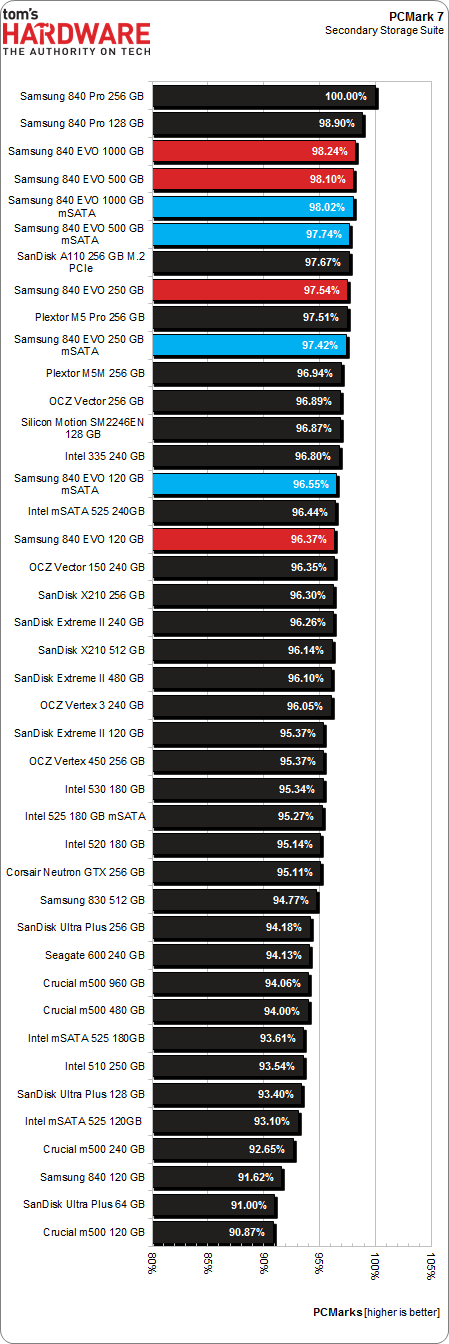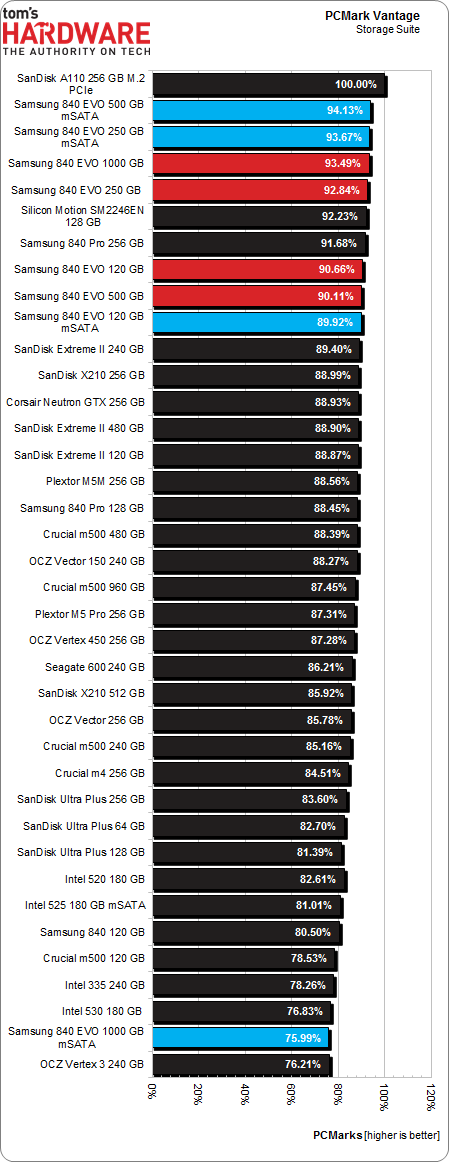Samsung 840 EVO mSATA Review: 120, 250, 500, And 1000 GB, Tested
Once upon a time, adopting mSATA-based storage meant compromising capacity and performance. With its 840 EVO, Samsung gives you access to as much as 1000 GB at incredibly fast speeds. The company even manages attractive pricing to keep mSATA competitive.
Results: PCMark 7 And PCMark Vantage
Futuremark's PCMark 7: Secondary Storage Suite
PCMark 7 uses the same trace-based technology as our Storage Bench v1.0 for its storage suite testing. It employs a geometric mean scoring system to generate a composite, so we end up with PCMarks instead of a megabytes per second. One-thousand points separate the top and bottom, but that encompasses a far larger difference than the score alone indicates.
This test is a big improvement over the older PCMark Vantage, at least for SSD benchmarking. The storage suite is comprised of several small traces. At the end, the geometric mean of those scores is scaled with a number representing the test system's speed. The scores generated are much different from PCMark Vantage, and many manufacturers are predisposed to dislike it for that reason. It's hard to figure out how PCMark 7 "works" because it uses a sliding scale to generate scores. Still, it represents one of the best canned benchmarks for storage, and if nothing else, it helps reinforce the idea that the differences in modern SSD performance don't necessarily amount to a better user experience in average consumer workloads.
Intentionally gamed through optimized firmware, or simply as a side-effect of excellent all-around performance, the 840 EVO drives excel in PCMark 7. Samsung's drives take the top six spots, and four of them are 840 EVOs (the 500 and 1000 GB mSATA-based drives finish behind the SATA-attached models).
Just remember that the actual delta between the fastest and slowest SSDs is still very small. In fact, we're starting the scale at 80% just to make it easier to identify differences. At full scale, there's only a sliver distinguishing one repository from the next.
Futuremark's PCMark Vantage: Hard Drive Suite
PCMark's Vantage isn't the paragon of SSD testing, mainly because it's old and wasn't designed for the massive performance solid-state technology enables. Intended to exploit the new features in Windows Vista, Vantage was at the forefront of consumer storage benching back in the day. Vantage works by taking the geometric mean of composite storage scores and then scaling them a lot like PCMark 7 does. But in Vantage's case, this scaling is achieved by arbitrarily multiplying the geometric sub-score mean by 214.65. That scaling factor is supposed to represent an average test system of the day (a system that's now close to a decade behind the times). PCMark 7 improves on this by creating a unique system-dependent scaling factor and newer trace technology.
Why bother including this metric, then? A lot of folks prefer Vantage in spite of or because of the cartoonish scores and widespread adoption. That, and the fact that most every manufacturer uses the aged benchmark in box specs and reviewer-specific guidelines. In fairness, Vantage's Hard Drive suite wasn't designed with SSDs in mind, and is actually quite good as pointing out which 5400 RPM mechanical disk might be preferable.
Get Tom's Hardware's best news and in-depth reviews, straight to your inbox.
In a reversal, the 250 and 500 GB mSATA-based 840 EVOs appear in front of their SATA-based relatives. Somewhat shockingly, the 1000 GB mSATA-attached model falls to the bottom. Like, straight next-to-last territory. Is something wrong? My guess is no.
Despite numerous tests on several systems, I kept coming up with similar performance on the heavily 4 KB-dependent Vantage HDD Suite. Again, I think this is likely due to some issue with NAND configuration on the 1000 GB model. Cramming 1024 GB of flash on an mSATA PCB without relying on a daughter board is impressive, though likely not without challenges.
Current page: Results: PCMark 7 And PCMark Vantage
Prev Page Results: Tom's Hardware Storage Bench, Continued Next Page Results: File Copy Performance With Robocopy-
blackmagnum Maybe it's time to upgrade the HD of an old working notebook to SSD! But will a Core2Duo processor bottleneck a SSD?Reply -
jrharbort @blackmagnum: You don't have to worry about your processor being a bottleneck, but rather, your system's SATA interface. It is highly doubtful that your Core 2-based notebook (much like my own) has an m-sata slot, and the 2.5" bay for a HDD would have a SATAII port, not SATAIII. So the overall max read/write rates would be cut in half. But to answer your question in another way, tom's posted an article almost a year ago on the subject of upgrading older systems with an SSD: http://www.tomshardware.com/reviews/ssd-upgrade-sata-3gbps,3469.htmlReply -
spookyman @blackmagnum: You be glad to upgrade your hard drive to a SSD drive. Did it for my goddaughter's after she had a hard drive crash and it runs a lot faster then before.Reply -
JohnnyLucky Interesting article. It coincides with the current shift from desktop pc's to mobile pc's.Reply -
pyro226 "The latest version offers RAPID support to non-EVO drives like the 840 Pro."Got my hopes up there. The standard 840 series SSDs are NOT supported. The article didn't explicitly state they were, but what other drives (aside from the 840 Pro and EVO) have Rapid support? Perhaps "The latest version offers RAPID support to both EVO and 840 Pro SSDs." would be more accurate.Reply -
LordConrad "This company has a track record of disrupting the markets it enters; now that it's focusing attention on smaller form factors with enthusiast-class hardware, it's only a matter of time before we start seeing M.2-based offerings as well."This is mainstream hardware, I don't know any enthusiats who will settle for drives with TLC NAND.Reply -
lowguppy It is nice to see these finally available. I've been watching the Crucial m500 mSATA drive for a while, and the 480gb version frequently falls under $300 on NewEgg, which is competitive with 2.5" SSDs.Reply -
RedJaron Reply
"Enthusiast" to me doesn't automatically mean getting the fastest, biggest, bestest, craziest parts regardless of price. It also means people who put a lot more thought into their systems and thoroughly weigh all their options. MLC, TLC, or not, the fact remains that the EVO is a fast, reliable drive for a good price.12750948 said:This is mainstream hardware, I don't know any enthusiats who will settle for drives with TLC NAND.
Your argument sounds similar to, "I don't know any enthusiasts who will settle for LGA 1150 instead of LGA 2011," or "I don't know any enthusiasts that would settle for a non-K CPU."

